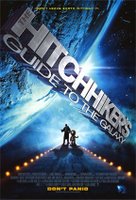 A couple of years ago, I was in the hospital during my birthday. Being in the hospital at any time is loads of no-fun, but being there for your birthday is 10 times more so. To cheer me up, my parents gave me a movie that they really enjoyed. It was called The Adventures of Buckaroo Banzai Across the Eighth Dimension. No joke. Needless to say, since I was in the hospital, I was not in the best frame of mind to really enjoy it, though I get the feeling I would not have enjoyed it even if I had just had the best sex of my life after being dipped in a vat of chocolate. It was a sci-fi movie, but also a spoof on sci-fi movies, pointing out the complete ridiculousness of the entire genre. The thing is that sci-fi people know that they are completely ridiculous, and really kind of enjoy it, so spoofs of them are generally well-received. However, the production values of Buckaroo Banzai were staggeringly low, and the time was simply not right for that movie. Well, sci-fi people, put on your party hats/dunce caps, because the time is now.
A couple of years ago, I was in the hospital during my birthday. Being in the hospital at any time is loads of no-fun, but being there for your birthday is 10 times more so. To cheer me up, my parents gave me a movie that they really enjoyed. It was called The Adventures of Buckaroo Banzai Across the Eighth Dimension. No joke. Needless to say, since I was in the hospital, I was not in the best frame of mind to really enjoy it, though I get the feeling I would not have enjoyed it even if I had just had the best sex of my life after being dipped in a vat of chocolate. It was a sci-fi movie, but also a spoof on sci-fi movies, pointing out the complete ridiculousness of the entire genre. The thing is that sci-fi people know that they are completely ridiculous, and really kind of enjoy it, so spoofs of them are generally well-received. However, the production values of Buckaroo Banzai were staggeringly low, and the time was simply not right for that movie. Well, sci-fi people, put on your party hats/dunce caps, because the time is now. The Hitchhiker’s Guide to the Galaxy is a most extraordinary book, and that’s more that just the first words of the actual book, first published in 1979 and written by Douglas Adams.
I will say, however, that the movie is NOT for people who haven’t read the book AND really enjoyed it. If you are one of those unenlightened masses who have not and/or did not, you will not get the jokes, will not understand the plot or what is so funny about it, and will not appreciate the particular brand of humor it presents. That’s not a cut on you. In fact, it’s more of a cut on those of us who do understand it. This is a great movie, but it’s for a very specific crowd of people, and everyone else would be a lot better off just seeing something else.
Martin Freeman plays Arthur Dent, the hapless earthling just along for the ride, upset at his circumstances but not able to escape thoughts of love. His performance is brilliantly British, which you can take any way you like. Mos Def is a very strange choice to play Ford Prefect, but that’s kind of the point. He does a good job as the guy who knows everything about everything, but isn’t obnoxious about it. Sam Rockwell is simply great as Zaphod Beeblebrox, President of the galaxy. He has said that his portrayal is a mix of Elvis Presley and Bill Clinton, and that just shows that he truly understands the character. Zooey Deschanel is meh as Trillian, except in the scene where she shoots Zaphod several times with the point-of-view gun, where she momentarily breaks out of her shell and shows more than one emotion on her face, a strange thing for a sci-fi movie or a comedy, even stranger for both. The movie is filled with fabulous supporting performances, Alan Rickman, Bill Nighy, and Anna Chancellor not among the least of them.
Honestly, this movie made me laugh like no movie has in the past year. It is because I appreciated all the jokes from having read the book. For someone who hasn’t read the book, the jokes might still be funny, but they would not have that familiarity with them that only reading the book can bring. However, this is one of the Bibles of the sci-fi world, so chances are that you have read it, as well. And if you have, congratulations, because you have discovered a pleasant, inoffensive,
“I think you should know that I’m feeling very depressed.”
“He’s got a TOWEL!!!”
“I never could get the hang of Thursdays.”
I’m kind of split on this, so I’m actually giving it two ratings.
For people who have read the book (and liked it): 15
For people who haven’t: -1
Particle Man










